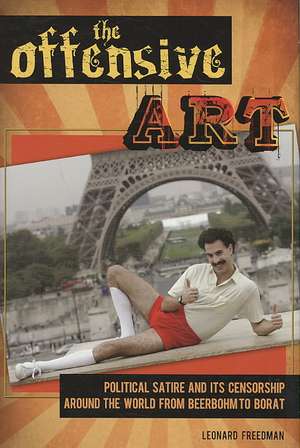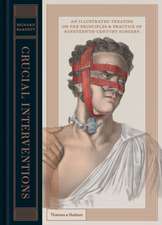The Offensive Art: Political Satire and Its Censorship around the World from Beerbohm to Borat
Autor Leonard Freedmanen Limba Engleză Hardback – 29 noi 2008 – vârsta până la 17 ani
Preț: 307.94 lei
Preț vechi: 375.08 lei
-18% Nou
Puncte Express: 462
Preț estimativ în valută:
58.93€ • 63.99$ • 49.50£
58.93€ • 63.99$ • 49.50£
Carte tipărită la comandă
Livrare economică 22 aprilie-06 mai
Preluare comenzi: 021 569.72.76
Specificații
ISBN-13: 9780313356001
ISBN-10: 0313356009
Pagini: 216
Dimensiuni: 156 x 235 x 25 mm
Greutate: 0.5 kg
Editura: Bloomsbury Publishing
Colecția Praeger
Locul publicării:New York, United States
ISBN-10: 0313356009
Pagini: 216
Dimensiuni: 156 x 235 x 25 mm
Greutate: 0.5 kg
Editura: Bloomsbury Publishing
Colecția Praeger
Locul publicării:New York, United States
Notă biografică
Leonard Freedman is Professor Emeritus of Political Science at the University of California, Los Angeles (UCLA), where he was Dean of the university's Continuing Education Division. He currently teaches political satire to UCLA undergraduates and extension students. He is the author of seven books, including Power and Politics in America, Politics and Policy in Britain, and Tension Areas in World Affairs. He wrote and narrated the National Public Radio series, Power in America.
Cuprins
List of IllustrationsPrefaceIntroduction: Satirists and CensorsPART I:(ALMOST) ANYTHING GOES: POLITICAL SATIRE IN AMERICA AND BRITAIN1. Puncturing the Imperial Presidency: FDR to George W. Bush2. Censorship, American Style3. Britain: From Bulldogs to Poodles4. Censorship, British StylePART II: A DANGEROUS GAME: POLITICAL SATIRE IN AUTHORITARIAN SYSTEMS5. Whats Funny About Hitler?6. Stalin and Mao: No Laughing Matter7. Imperial Ironies: India and the Raj8. The Middle East: Raging Against CartoonsConclusion: Still More Satire And Why We Need It
Recenzii
Freedman (emeritus, political science, U. of California at Los Angeles) presents a comparative history of the struggle between political satirists and censors in democracies and authoritarian states. Examining the United States and Britain in turn, he offers chapters discussing, first, how satirists have targeted political leaders and, second, the types of constraints they have faced. He then provides more broad-brush discussion of satirists and censorship in Nazi Germany, Stalinist Russia, Maoist China, British India, and the contemporary Middle East.









